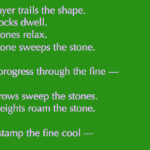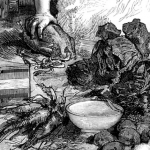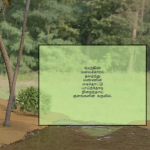electropoetics
Learning Management Platforms: Notes on Teaching “Taroko Gorge” in a Pandemic

Dani Spinosa reflects on the relocation of e-Lit scholarship and pedagogy "in the remote classroom for the precariat writ large."
Gastropoetics

While Gastropoetics is a marginal practice, these culinary experiments explore the relational dynamics of cooking, hospitality, and eating as persistent humanistic practices, even as such practices are increasingly mediated by "food selfies" and other emerging, performative taste practices. Key to understanding the appeal of gastropoetics is the ad hoc nature of human production and consumption (see de Certeau's "everyday life") performed under the constraints of the generated menu, of the platform, and of the mnemotechnical system itself.
Electronic literature as a method and as a disseminative tool for environmental calamity through a case study of digital poetry ‘Lost water! Remains Scape?’

Reflections on an emerging digital poetry whose primary theme is ecological loss, and personal reminiscence.
The Art Object in a Post-Digital World: Some Artistic Tendencies in the Use of Instagram

While defining the art object in a post-digital world, Maria Goichoechea de Jorge observes in media artists a nostalgia for an analogue craftsmanship; a rebellion against machinic perfection; and a resistance to forms of human creativity that propel us into an ever more profound symbiosis with our technological lifeworld.
Digital Narrative and Experience of Time

Through the examples of three types of digital stories, including an interactive narrative for the smartphone based on notifications, a web narrative based on a real time data flow, and the widely used social media feature of stories, Bouchardon and Fülöp explore the relationship between the digital, temporality, and narrative. They ask, "what new narrative forms, or even new concepts of narrative do these new temporal experiences provided by digital technology offer to us?"